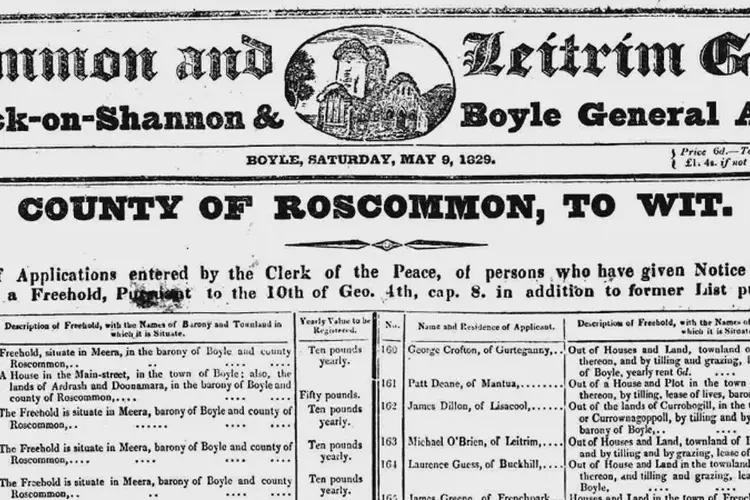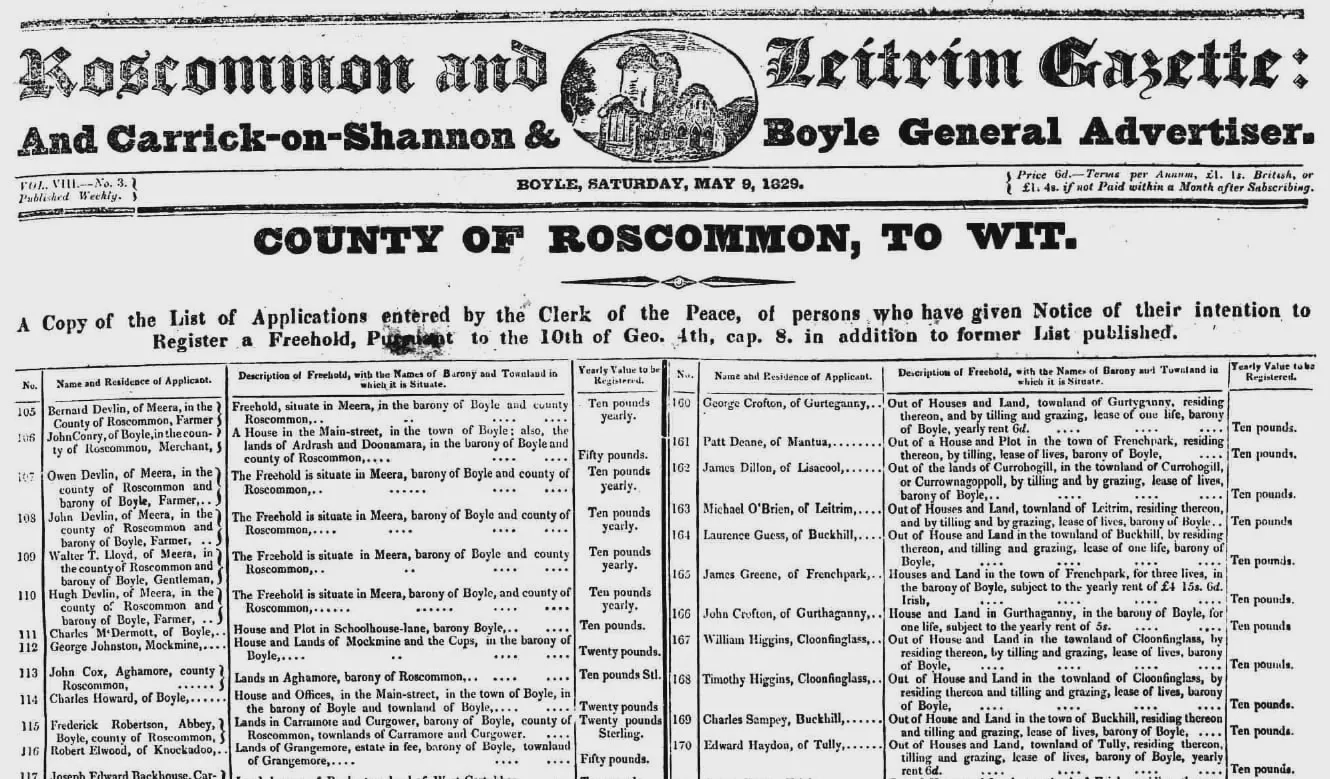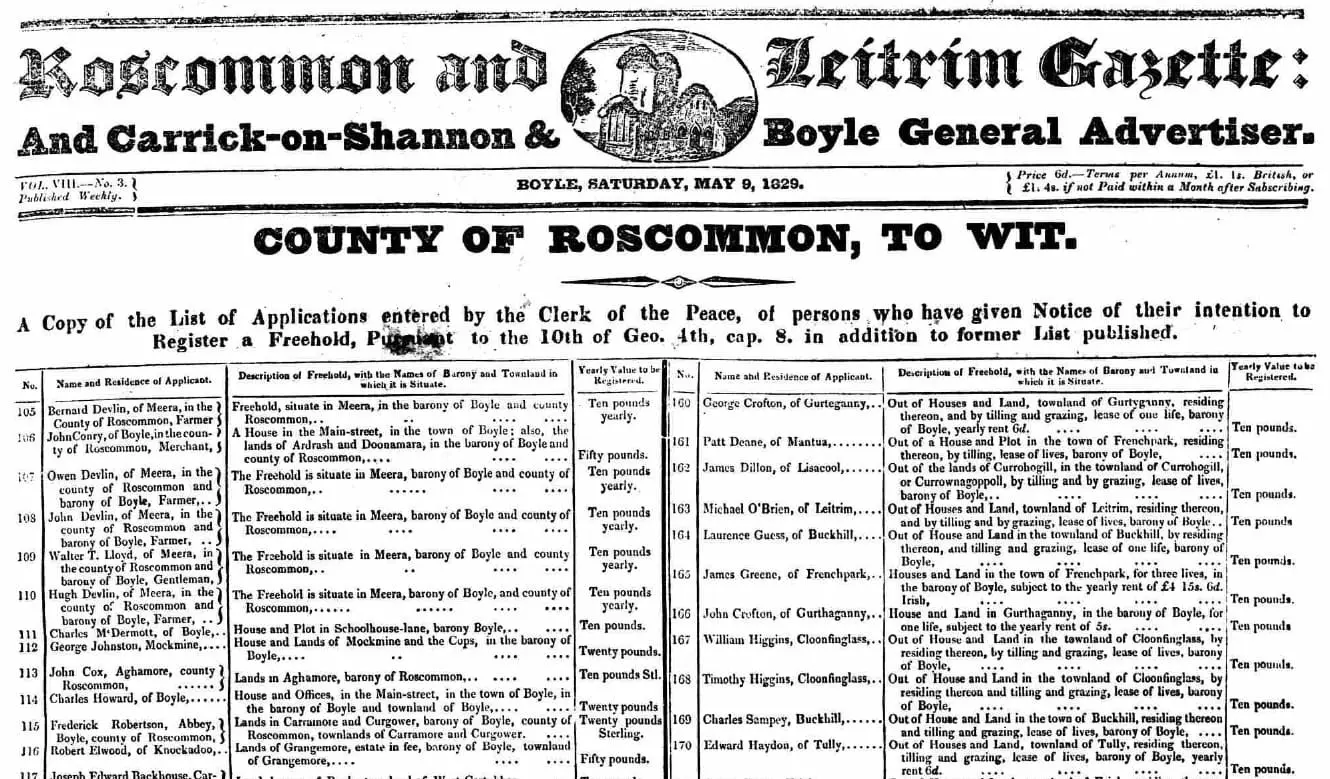
- Michael McManus
- Articles
- December 18, 2023
Table of Contents
At 10pm. on the night of 25th. June, 1831, Sergeant Thomas Armstrong, of the staff of the Roscommon Militia, was returning home peacefully after visiting a friend in his home town of Boyle, County Roscommon, when he met in the street a local man of disrepute, namely William, alias ‘Billy the Boy’, McManus.
‘Be off the street instantly’, said Billy to the Sergeant, ‘or I will drag you like a horse’s head to a bonfire’.
Sergeant Armstrong returned home without answering McManus, for he knew too well his character and to answer him back would have been folly.
Half an hour after returning home Armstrong heard McManus at his front door. ‘Come out’ shouted McManus, but he would not go outside for he knew McManus to be a dangerous man and did not want anything to do with him.
The Sergeant’s son opened the door and saw another man with McManus.
‘What do you want?’ asked the son.
‘Send out your father’, said both men.
The son shut the door. At this a stone was thrown from outside the house and it entered through the living room window where Armstrong and his family were - it struck Armstrong causing him slight injury. McManus and his associate ran off, followed in close pursuit by Armstrong’s son - but the two were eventually lost.
Trial of William McManus
Thus was the evidence given by Sergeant Armstrong when he appeared as a witness and complainant at the trial of William McManus, indicted at Boyle Quarter Sessions, for assault on Armstrong’s dwelling house. When asked by the Court if he wished to ask any questions of the witness McManus had put some questions which, according to the court reporter of the Roscommon and Leitrim Gazette, were mainly ‘unconnected with the trial at issue’.
However, the reporter considered the following questions and answers worthy of remark and relevant to the case:
Prisoner - ‘Did you see me throw the stone through the window?’
Witness - ‘I did, for I was struck with it while looking through the window; I saw the stone previously in your hand: and even if I did not see you throw the stone your attack on me in the street would be sufficient cause to suspect you.’
The following is a little less relevant:
Witness - ‘did you draw your bayonet that night on a boy of the name of Patt Dyer, a shoemaker?’
Witness - ‘No, I did not. I never drew a bayonet on him.’

Philip Leddy
In defence, a man named Philip Leddy was examined. It would appear that Leddy was of no more repute than McManus, for the reporter found it relevant to note that: ‘Here we wish to remind our readers that this same Philip Leddy is no less a personage than the very man whose character will be seen in true colours by a reference to the number of our journal that contains the account of the Leitrim Assizes’.
Leddy told the court that he had been on the street the night that Armstrong’s house had been attacked and thought that McManus did not throw the stone but that a man named Callely had thrown it - he was in fact certain that McManus had not thrown it.
Leddy had come to town that day with pigs and had seen McManus and Callely outside Armstrong’s door in Church Street - he had gone through that street as a short-cut to the mountains and had not returned to his home until near day. Cross examined, Leddy’s reliability as a witness began to fray at the edges. He told the court that he had come to give evidence especially for McManus and had not received a Crown Summons to attend.
However, he did have business of his own to see to in the town that day and had come to buy leather for a pair of shoes. He told the court that he had with him 4s 3d and thought that would pay for a pair of shoes. (Here the court asked him to show the money). The announcement of this question completely electrified Leddy and he frantically searched through his pockets, but not a penny could he produce from them to verify the truth of his evidence - his trousers, however, were seen by the court to be covered with pocket-holes.
The journalist reported: ‘but alas! poor Philip, his cash was run out and he had to run off, for his plea of short counts would not be taken. Good-bye Phil.’
The case did not appear to be going well for Billy.
James Conroy
Next the witness James Conroy was examined. He clearly recalled the night Armstrong’s window was broken and he had seen McManus and Callely going up the street towards Mr, Armstrong’s house. He saw the two stagger against the house and that there were another two men in the company. He then heard the window break. When John Fannon was examined, he told the court that he lived opposite Armstrong and he recalled the night in question. He had seen McManus and Callely coming up the street, saw them go to Armstrong’s door, ask to go in and be refused. He had seen candlelight in the house. He had heard the window breaking but McManus did not break the window according to Fannon. He had seen Philip Leddy on the street, and he had pigs with him.
Acquitted
Without leaving the box the jury then returned a verdict of ‘Acquittal’ and consequently, in the words of the reporter, ‘Billy was himself again!!!’
Back in Court
Five days later Billy was again at court in Boyle - this time the Petty Sessions with Magistrates Owen Lloyd, C. Mulloy and H. Fry Esquires sitting.

Roscommon Leitrim Gazette
The Roscommon and Leitrim Gazette report on Boyle Petty Sessional Court of Monday, June, 11th. 1832, described the following list of cases for that day:
- Hirelings Wages - 10
- Assault - 6
- Trespass - 3
- Rape - 1
- Felony - 1
- Forcible Possession - 1
The court, not withstanding the wetness of the day, was crowded. One of the most popular cases for those in the public gallery was a ‘cross cause’ complaint of assault, defendants being, John and Bridget Power, Robert and Jane Lee the local licensees and, yes, you’ve guessed it, Billy McManus.
The reporter goes on:
At this moment a general rush ensued to gain the most convenient place of hearing and several moments elapsed ere order was restored. During this confusion the table was being mounted on every side by the ‘worthies’ who all evinced an anxiety for an opportunity to ’ hedge in a word’ in their own defence. In the hands of one was to be seen a large stone about eight pounds in weight, with another a large tongs and with a third a shirt that bore striking testimony to the effusion of claret - and here and there could be discovered specimens of rainbow tinting neatly executed on the eyes of the parties.
Justice was Booming in Boyle
40 cases were heard that day - justice was booming in Boyle. The Gazette reporter noted that of these there were few assaults and in the main the cases related to that of hireling’s wages.
The reporter went on:
On our entering the Courthouse we were not a little surprised at beholding that well known character, Billy McManus, in the dock again. Our readers cannot but recollect that it is only a few days since this individual was released from the very spot on which he now stood, and for a similar, if not worse, offence with which he so lately has been charged.
Mr. Lloyd, whose praiseworthy conduct and exertions as a magistrate cannot be too highly spoken of, remonstrated with the prisoner relative to the dissipated course he was pursuing and pointed out to him the eventual result of such conduct he also told him that if he, and the rest of his associates, did not conform to some rule of better conduct, he would, as far as powers were vested in him, enforce the full rigours of the law against each and every one of whom who might (he trusted ere long) be brought before him, and thereby restore this town to its wanton state of tranquillity; for whilst the night walkers and drunkards that now infest and disturb the peace of this town, continue to perambulate the streets at unreasonable hours neither person nor property can remain secure from their grasp.
Mr. Lloyd, having thus ended his salutary (and long-winded) advice, the Clerk proceeded to call the names of the persons concerned in the charge against the prisoner - a Constable of Police came forward and told the Bench that the person whom the prisoner assaulted was lying dangerously ill from the effects of the beating he received, and was, in consequence, not able to attend; nor was he (continued the Constable) willing were he able to attend to urge the charge further.
Magistrate: What is his name and where does he live?
Clerk: His name is Dyer - he lives on the Sligo road.
Mr Lloyd then said he would go, after the business of the day was disposed of, to the house of the injured man, notwithstanding the distance of his abode and the inclemency of the day.
Billy asked permission of the Bench to be escorted to Dyer’s house and he would engage that Dyer would acquit him!
Mr. Lloyd refused him to do so and ordered him to be removed from the dock to the prison until he would return, which was accordingly complied with. In the course of the evening we observed Billy on the streets ‘at home in his glory again’!!!’
Related Posts


Where Rests Our Genesis
- December 15, 2021
- Articles
Where rests our Genesis: An historical note on the noble and ancient clan McManus of North Roscommon, Ireland, together with nominal references from five Catholic Parish es: Aghanagh Ardcarne and Tumna, Boyle and Kilbryan, Kilronan, and Kill

James McManus
- December 17, 2021
- Articles
James McManus, my great great grandfather, was born shortly after the Battle of Ballinamuck, which took place on the borders of Counties Longford and Leitrim in 1798, when the French Army under General Humbert and the Irish Rebels were brutally defeated by an English Army of 29,000 men under Lord Cornwallis and General Lake